Biobased resources
A major goal of the bioeconomy is to use larger quantities of biobased raw materials to produce energy, transport fuels and feedstock for industrial processes. This requires detailed analyses, simulations, concepts and processes. Major focus needs to be placed on issues relating to crop production, biomass potentials, land surface requirements, conversion technologies, biobased value creation networks and food security. Agriculture, forestry, waste management and the industry in general will need to work in concert as far as the raw materials all of them use or deal with are concerned.
-
Project FuTuReS - 12/12/2022
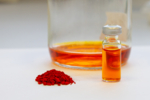
Algae are aquatic organisms that flourish in a huge variety of species. But that's not all: they are also small green mini-factories that can produce all kinds of valuable materials. All they need is water, light, CO2 and a few nutrients that can be recycled from biogas or sewage treatment plants. Researchers have now determined the optimal framework conditions and practicability of process methods for agricultural algae cultivation.
-
With insects to the circular economy - 30/11/2022
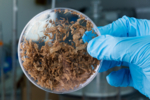
Insect larvae can convert food leftovers and waste into secondary raw materials for technical products and cosmetics. Researchers are looking to establish an insect biorefinery for this purpose at the Fraunhofer IGB in Stuttgart. The InBiRa project is financed with a total of 3.8 million euros in EU and Baden-Württemberg state funding.
-
Festo’s high-tech bioreactor - 10/11/2022
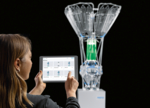
In future, algae could be used to produce practically everything that still requires petroleum, including plastics, fuels, medicines and food. Algae are also climate savers par excellence, because they bind ten times more CO2 than terrestrial plants. Festo, a company based in Esslingen, Germany, has developed a high-tech bioreactor that can be used to automatically cultivate the small green biofactories - and that do so a hundred times more…
-
Büsnau biorefinery - 05/10/2022
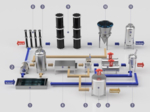
Our wastewater not only contains dirt and excretions, but is also rich in carbon, nitrogen and phosphorus, which can be recovered. A sewage plant can thus become a source of raw materials. In the KoalAplan project, a new type of biorefinery will be used to convert the carbon recovered from wastewater into sustainable products.
-
Sustainable nutrition - 05/09/2022
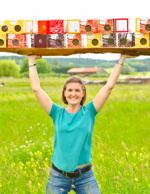
Insects on the dinner plate? Some people instantly dismiss the idea. Wrongly so, because in terms of animal welfare, ecological footprint and healthy nutrition, insect foods are much better than all other animal foods and are produced in a more controlled way. The fact that they can also taste really good is proven by the start-up Beneto Foods from Albstadt, which has developed protein-rich pasta in various flavours using cricket flour.
-
Project BW2Pro - 29/08/2022
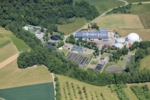
In 2020, Germany’s population collected over 5 million tonnes of biowaste. Most of this was composted, and some was fermented into biogas. Scientists in Baden-Württemberg think there's room for more. Within the project ‘Biowaste to Products’ (BW2Pro) they want to transform biowaste into new products in a biorefinery. The idea is to produce biodegradable plant pots, mulch material, fertilisers, enzymes and biobased plastics in addition to…
-
Paludiculture as a beacon of hope for the climate - 28/06/2022

Peatlands store more carbon dioxide than any other ecosystem in the world. However, when drained, they become a climate-damaging source of CO2. The management of wet peatlands reveals exciting solutions, with market potential in the areas of local heating, insulation, packaging and even peat substitution.
-
Renaturalised peatlands as carbon dioxide stores - 14/06/2022

All intact peatlands on our planet store twice the amount of CO2 as all forests. Peatlands are indispensable for preventing and mitigating the effects of climate change. The only problem is that 95 percent of Germany's peatlands have been drained, and thus release around 7 percent of Germany’s total CO2 emissions into the atmosphere. Rewetting is therefore imperative for the climate, the environment and biodiversity – and economically…
Website address: https://www.biooekonomie-bw.de/en/articles/biobased-resources







